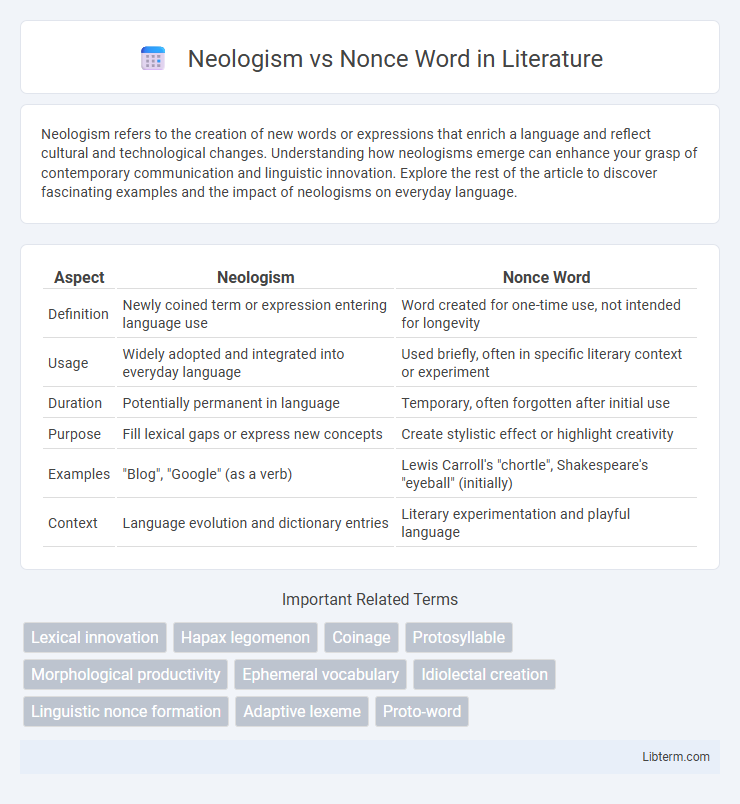Neologism refers to the creation of new words or expressions that enrich a language and reflect cultural and technological changes. Understanding how neologisms emerge can enhance your grasp of contemporary communication and linguistic innovation. Explore the rest of the article to discover fascinating examples and the impact of neologisms on everyday language.
Table of Comparison
| Aspect | Neologism | Nonce Word |
|---|---|---|
| Definition | Newly coined term or expression entering language use | Word created for one-time use, not intended for longevity |
| Usage | Widely adopted and integrated into everyday language | Used briefly, often in specific literary context or experiment |
| Duration | Potentially permanent in language | Temporary, often forgotten after initial use |
| Purpose | Fill lexical gaps or express new concepts | Create stylistic effect or highlight creativity |
| Examples | "Blog", "Google" (as a verb) | Lewis Carroll's "chortle", Shakespeare's "eyeball" (initially) |
| Context | Language evolution and dictionary entries | Literary experimentation and playful language |
Defining Neologisms
Neologisms are newly coined terms or expressions that gain acceptance and usage across language communities, often reflecting cultural or technological changes. They differ from nonce words, which are created for one-time use and lack widespread adoption or permanence in the lexicon. Defining neologisms involves identifying their emerging role in communication, linguistic innovation, and semantic shifts within evolving discourse.
What is a Nonce Word?
A nonce word is a term created for a single occasion or specific context, often invented spontaneously to meet an immediate lexical need. Unlike neologisms, which may gain widespread acceptance and enter common usage over time, nonce words typically remain confined to their original context or usage. Linguists study nonce words to understand language creativity and the processes of word formation and lexical innovation.
Key Differences Between Neologism and Nonce Word
Neologisms are newly coined terms or expressions that gain acceptance and widespread use over time, often filling gaps in language for emerging concepts or technologies. Nonce words are created for one-time use within a particular context and typically do not enter common vocabulary or receive broad recognition. The key difference lies in the longevity and adoption: neologisms become permanent additions to the lexicon, while nonce words remain temporary linguistic inventions.
Historical Origins of Neologisms
Neologisms originated as a linguistic response to evolving cultures and technological advances, reflecting the need to name new concepts and inventions. Historically, many neologisms entered languages through scientific discoveries, literary works, and social changes, embedding themselves firmly over time. Nonce words, by contrast, are often created spontaneously for temporary use, lacking the enduring adoption that characterizes classical neologisms.
The Role of Nonce Words in Language Innovation
Nonce words serve as linguistic experiments, enabling speakers to introduce novel terms that may address specific communicative needs or conceptual gaps. These spontaneous creations can influence language innovation by testing new meanings or phonetic combinations, which sometimes evolve into neologisms when they gain wider acceptance. The transient nature of nonce words allows languages to adapt flexibly, reflecting cultural and technological changes dynamically.
Usage Examples: Neologisms and Nonce Words
Neologisms such as "selfie" and "blogosphere" have become widely accepted in modern language, reflecting cultural and technological shifts. Nonce words, like Lewis Carroll's "chortle," are created for a specific context or literary purpose and rarely enter everyday usage. Both neologisms and nonce words illustrate the dynamic nature of vocabulary evolution, but neologisms tend to achieve broader adoption and longevity.
Lifespan and Evolution in Language
Neologisms often undergo a longer lifespan as they become integrated into mainstream language, gradually evolving in meaning and usage over time. Nonce words tend to have a brief existence, created for immediate, contextual use and rarely persisting beyond a single occasion. The evolution of neologisms reflects broader linguistic trends and cultural shifts, while nonce words highlight creativity and situational language play.
Acceptance and Standardization
Neologisms undergo a gradual process of acceptance and standardization within language communities, often becoming established entries in dictionaries and mainstream usage over time. Nonce words, created for a specific occasion or context, typically lack widespread acceptance and do not enter common linguistic standards. The transition from nonce word to neologism depends on frequency of use, cultural relevance, and inclusion in authoritative language references.
Impact on Communication and Culture
Neologisms introduce lasting innovations in language, enriching communication by providing new terms that reflect evolving cultural concepts and technological advancements. Nonce words, created for immediate, context-specific use, often enhance creativity and playfulness without long-term adoption. The impact of neologisms tends to shape cultural identity and collective understanding, while nonce words contribute to linguistic experimentation and temporary expression.
Summary: Understanding Their Distinct Roles
Neologisms are newly coined terms gradually integrated into a language, reflecting evolving culture, technology, or ideas, while nonce words are created for a single occasion or purpose without lasting usage. Neologisms gain acceptance through widespread adoption and lexical recognition, contributing to language expansion. In contrast, nonce words serve immediate communicative needs, often exhibiting creativity without enduring semantic value.
Neologism Infographic

 libterm.com
libterm.com